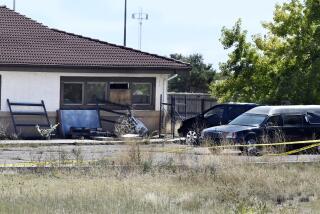Couple Accuses Kansas of Grave-Robbing
- Share via
KANSAS CITY, Mo. — Marc and Diane DeFries Thiry buried their stillborn daughter on a hill covered with prairie grass, a spot on their 150-acre ranch where they wanted to be buried themselves.
For nearly two years, the Tonganoxie, Kan., couple fought to hold onto the four acres of their land the state wanted for a highway turnaround. The state obtained the land for $15,000 through a condemnation proceeding. Even when the Thirys lost a court decision in June, they refused to dig up the grave.
Then, early on June 21 while the Thirys were asleep, a burial company hired by the Kansas Department of Transportation dug up the concrete slab containing the ashes of Qatlin Soux DeFries Thiry and removed a cross and two stone markers.
“They snuck in like thieves in the night and they robbed our child’s grave,” Diane Thiry said. “After a primal scream, I kind of gathered myself together.”
The Thirys, who live about 30 miles west of Kansas City, Mo., have filed a petition with the U.S. Supreme Court asking for a review of the case.
The couple sued the state in October 1994, claiming the turnaround would violate the Religious Freedom Restoration Act, which bars the government from interfering with the exercise of religious freedom unless it can show a “compelling interest.”
The couple, who describe their religion as a mix of Quaker and Native American philosophies, won a restraining order from a state judge in 1994, but lost the case in May 1995.
A federal appeals court agreed with the lower court ruling, and last month, a justice of the U.S. Supreme Court rejected their request to extend the restraining order while they filed a new appeal.
That’s when the state moved forward.
“We just couldn’t put it off any longer,” Mike Rees, the state agency’s chief counsel, told the Journal-World of Lawrence. “We were facing some real substantial cost if the contractor couldn’t go in there.”
After the ashes were taken to the burial company, Rees faxed the Thirys’ lawyer a letter telling them where they could pick up the remains, which had been buried in August 1992.
Rees said the state warned the family in two letters that the remains would be removed if the family didn’t do it. “It’s true we didn’t say we’ll do it on a given date,” he said.
For now, the Thirys are keeping the remains on the back of their pickup until they decide what to do next.
“There’s nothing more that I would love than to take them right back up there and bury them,” Diane Thiry said. “But we’d have to guard them 24 hours a day.”
More to Read
Sign up for Essential California
The most important California stories and recommendations in your inbox every morning.
You may occasionally receive promotional content from the Los Angeles Times.













